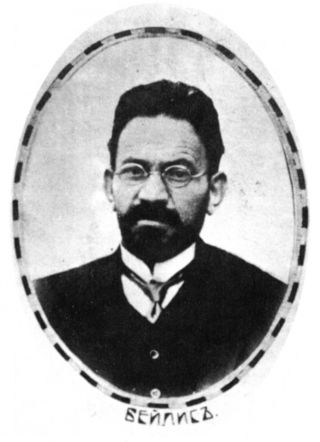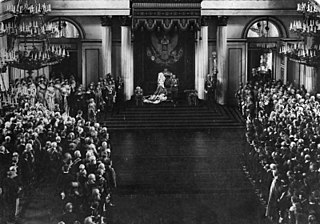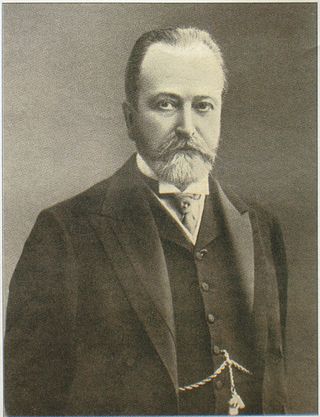| |||||
| Decades: | |||||
|---|---|---|---|---|---|
| See also: | |||||
Events from the year 1911 in Russia .
| |||||
| Decades: | |||||
|---|---|---|---|---|---|
| See also: | |||||
Events from the year 1911 in Russia .
| | This section needs expansion. You can help by adding to it. (July 2016) |
| | This section needs expansion. You can help by adding to it. (July 2016) |
| | This section needs expansion. You can help by adding to it. (July 2016) |

Pyotr Arkadyevich Stolypin was a Russian statesman who served as the third prime minister and the interior minister of the Russian Empire from 1906 until his assassination in 1911. Known as the greatest reformer of Russian society and economy, his reforms caused unprecedented growth of the Russian state, which was halted by his assassination.

Ivan Logginovich Goremykin was a Russian politician who served as the prime minister of the Russian Empire in 1906 and again from 1914 to 1916, during World War I. He was the last person to have the civil rank of Active Privy Councillor, 1st class. During his time in government, Goremykin pursued conservative policies.

The chairman of the government of the Russian Federation, also informally known as the prime minister, is the head of government of Russia. Although the post dates back to 1905, its current form was established on 12 December 1993 following the introduction of a new constitution.

Dmitry Grigoriyevich Bogrov was the assassin of Prime Minister Pyotr Stolypin.

Menahem Mendel Beilis was a Russian Jew accused of ritual murder in Kiev in the Russian Empire in a notorious 1913 trial, known as the "Beilis trial" or the "Beilis affair". Although Beilis was eventually acquitted after a lengthy process, the legal process sparked international criticism of antisemitism in the Russian Empire.
The Russian Council of Ministers is an executive governmental council that brings together the principal officers of the Executive Branch of the Russian government. This includes the chairman of the government and ministers of federal government departments.

The Kyiv Opera group in Ukraine was formally established in the summer of 1867, and is the third oldest opera in Ukraine, after Odesa Opera and Lviv Opera.

Vasily Alekseyevich Maklakov was a Russian student activist, a trial lawyer and liberal parliamentary deputy, an orator, and one of the leaders of the Constitutional Democratic Party, notable for his advocacy of a constitutional Russian state. He served as deputy in the (radical) Second, and conservative Third and Fourth State Duma. According to Stephen F. Williams Maklakov is "an inviting lens to which to view at the last years of Tsarism".

The State Duma, also known as the Imperial Duma, was the lower house of the legislature in the Russian Empire, while the upper house was the State Council. It held its meetings in the Tauride Palace in Saint Petersburg. It convened four times between 27 April 1906 and the collapse of the empire in February 1917. The first and the second dumas were more democratic and represented a greater number of national types than their successors. The third duma was dominated by gentry, landowners, and businessmen. The fourth duma held five sessions; it existed until 2 March 1917, and was formally dissolved on 6 October 1917.

Viktor Alekseyevich Zubkov is a Russian civil servant, politician and businessman who served as the 36th Prime Minister of Russia from September 2007 to May 2008. He was Vladimir Putin's First Deputy Prime Minister during the presidency of Dmitry Medvedev.

Legislative elections were held in the Russian Empire from 26 March to 20 April 1906. At stake were the 497 seats in the State Duma of the Russian Empire, the legislative assembly. Election for the First State Duma, which only ran from 27 April to 8 July (O.S.) 1906, returned a significant bloc of moderate socialists and two liberal parties which demanded further reforms. For this reason, it is sometimes called the Duma of Public Anger.

Ivan Antonovich Dumbadze was a Major-General of H. I. M. Retinue of Nicholas II, Supreme Head of Yalta, one of the activists of the Union of Russian People, notorious for his antisemitic and extravagant escapades.

Viktor Ivanovich Ilyukhin was a Russian State Duma deputy, member of the Communist Party of the Russian Federation, Chairman of the State Duma Committee on security, member of the State Duma's anti-corruption committee, member of the State Duma committee to consider of the federal budget on the defense and security of the Russian Federation, and Chairman of the Movement in Support of the Army.
The following lists events that happened during 1910 in the Russian Empire.

The State Duma of the Federal Assembly of the Russian Federation of the 4th convocation is a former convocation of the legislative branch of the State Duma, Lower House of the Russian Parliament. The 4th convocation met chiefly at the State Duma building in Moscow ; it worked from December 7, 2003 to December 24, 2007.

Cabinet of Pyotr Stolypin – composition of the Council of Ministers of the Russian Empire, under the leadership of Pyotr Stolypin, worked from July 21, 1906 to September 18, 1911.

Cabinet of Vladimir Kokovtsov – composition of the Council of Ministers of the Russian Empire, under the leadership of Vladimir Kokovtsov, worked from September 22, 1911 to February 12, 1914.
Events from the year 1909 in Russia.
Events from the year 1906 in Russia.

The Council of Ministers of the Russian Empire was the highest executive authority of the Russian Empire, created in a new form by the highest decree of October 19, 1905 for the general "management and unification of the actions of the chief heads of departments on subjects of both legislation and higher state administration". The ministers ceased to be separate officials, responsible to the emperor, each only for their actions and orders.
![]() Media related to 1911 in Russia at Wikimedia Commons
Media related to 1911 in Russia at Wikimedia Commons